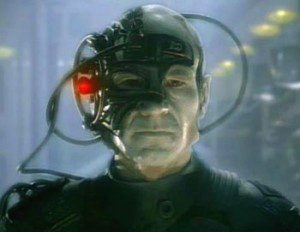“Thou shalt not make a machine in the likeness of a human mind.” Orange Catholic Bible

That quotation comes from a fictional sacred text found only in the imaginary universe of Frank Herbert’s Dune saga. But if things keep going the way they’re going, we may need that “Bible”.
Dune is about a distant future, over ten thousand years from now. Man has gone off to colonize the galaxy, but on the way there has been a great social upheaval. The machines man made had come to dominate him, and even enslave him. Some of the elite had merged with the machines, achieving god-like power and seemingly unending life, while the rest of humanity was enervated and idle. Then came the war, the Butlerian Jihad. Over a 100 year span the machines were defeated and the new commandment you see above was enshrined.
Just so much science fiction?
I wish it were so. If you’re dismissive of science fiction, you shouldn’t be. Not only has this preoccupation of teenage boys predicted many of the things we enjoy today, everything from smart phones to gene therapy, it has helped to direct the aspirations of of those boys.
You could say science fiction is a series of thought experiments about the role of science and technology on the development of human society.
What are people for?
I have a book, a collection of essays actually, by Wendell Berry by that title. It’s a good question, one of the basic questions. A great deal depends on the answer. I’m afraid most of the people working in the fields of science and engineering proffer a really bad answer. And because the question is so terribly important to being human, the implications are dehumanizing.
The real Bible tells us that man was made in the image of God and was immediately situated in a garden in order to cultivate it. That work was performed within a household economy right from the start. The union of a man and wife was intended to be productive and they were to share both the work and the fruit. That work included their very bodies: Eve is the mother all the living and Adam is the husbandman, tilling the soil of her body. And they are to be fruitful and multiply and extend their dominion, their household–over all the earth–dominion being a dwelling–a domus.

The rise of the machines
The rise of the machines began when creation was reconceived as a machine. Once, man had been the center, a microcosm, the hermeneutic of the cosmos. Man’s life was the scale by which the universe was ordered. This was the lodestar of classical humanism. And it made the cosmos our home.
But today we see things quite differently. The universe is a vast mechanism and human beings are just tiny cogs in it, perhaps even malfunctioning cogs. But we are still microcosms, but now the hermeneutic works in reverse. Now the machine defines us.
Are you obsolete yet?
A few years back a feminist fantasy purporting to be social commentary was published entitled, The End of Men. The gist of it was pretty simple, men are obsolete because many of the functions traditionally performed by men are now preformed by either the welfare state, or by machines. (The same thing, actually, the welfare state is a machine.)
I’m not sure what makes feminists think they are exempt from obsolescence. Many of the jobs performed by women in the corporate economy are just as vulnerable to being made redundant by machines. (See the video below to see this explained.) Even romantic and sexual functions performed by women are subject to obsolescence; virtual reality-porn is just around the corned and there are even sex-bots. And don’t think your uterus makes you indispensable ladies, they’re working on a replacement for that too. (Click here to learn about artificial wombs.)
But the very notion that a human being could be made obsolete by a machine reveals that we have already given ourselves over to the machine. In part it goes back to the loss of human scale and the centrality of the household economy. When production moved out of the house so that the division of labor and economies of scale could increase production, it was only a matter of time before human beings were re-conceived as parts of larger mechanisms, and therefore subject to obsolescence.
Today, households have been reduced to centers of consumption, places we go at the end of the day to watch television, sleep, and maybe eat. The transformation from a center of production to a center of consumption is reflected in the transformation of the word “householding”. (A word my spell-checker dosen’t recognize, by the way.) What used to be a near synonym to “family-business” now is a term used by marketers to refer to mass mailings of a certain type.
Now human beings run the risk of justifying their existence solely by their role as consumers in the machine economy. Some technophiles, seeing no other use for the rest of us, have proposed putting everyone on the dole, with an allowance, so we can give the machine economy something to do. But will that dehumanize us? Think about the indolence of aristocrats in the past. Do we really want to democratize that and turn the entire human into a mass of entitled and useless slugs?
The choice before us
I’m not your run of the mill luddite. I like tools, and I am deeply impressed by the technical achievements of our engineers. But we shouldn’t just let ourselves be carried along like flotsam and jetsam in the wake of technological development. We need to choose between one of two ways of working with these changes, it seems to me.
Transhumanism

The first possibility is to merge with the machines completely. There are people out there advocating the way of the Cymeks of Dune. They claim we should upgrade ourselves and take a hand in our own evolution. (If you think this is overblown or hyperbolic, just follow the diva of transhumanists, Ray Kurzweil and I think you’ll begin to see things differently.)
But this seems like hubris to me, and it even contradicts what we are told repeatedly by those enemies of teleology, materialists of all sorts. Evolution is supposed to be a blind process, feeling its way forward, filling niches in a vast interdependent mechanical system. Transhumanists radically, and I think fatally, overestimate our ability plan and control human development. And doesn’t radically extending human life-span, genetically modifying people, and merging humans with machines make for a new species? And how will this be implemented? Won’t the wealthy be the early adopters? And how will they feel about the rest of us? Don’t we have enough of the contempt of the rich already? Wealth and moral stature seem to have almost no relationship to each other except in a negative sense. If anything, wealth produces hubris, and hubris breeds contempt, and contempt makes you stupid.
The recovery of the household economy
There is another way entirely. These new technologies could portend a re-centering of the economy in the household. Telecommunication networks, and small scale, highly adaptive manufacturing, will allow for a decentralized economy where husbands and wives, and even children, could work together. There is so much I could say about this, but I’ve already gone on too long.
What we need is dreamers, people who can envision an altogether different future than the one seen by the transhumanists. We need a vision of man the microcosm again, where our creations enrich us, and lend meaning to our lives, not replace us or turn us into monsters.
If you think I’ve overstated the choice, or have taken leave of my senses, I leave you with the following video. I hope you can agree with me by the end of it; if we can’t redirect this freight train of technological innovation in a more humane direction, let the Butlerian Jihad begin.
















